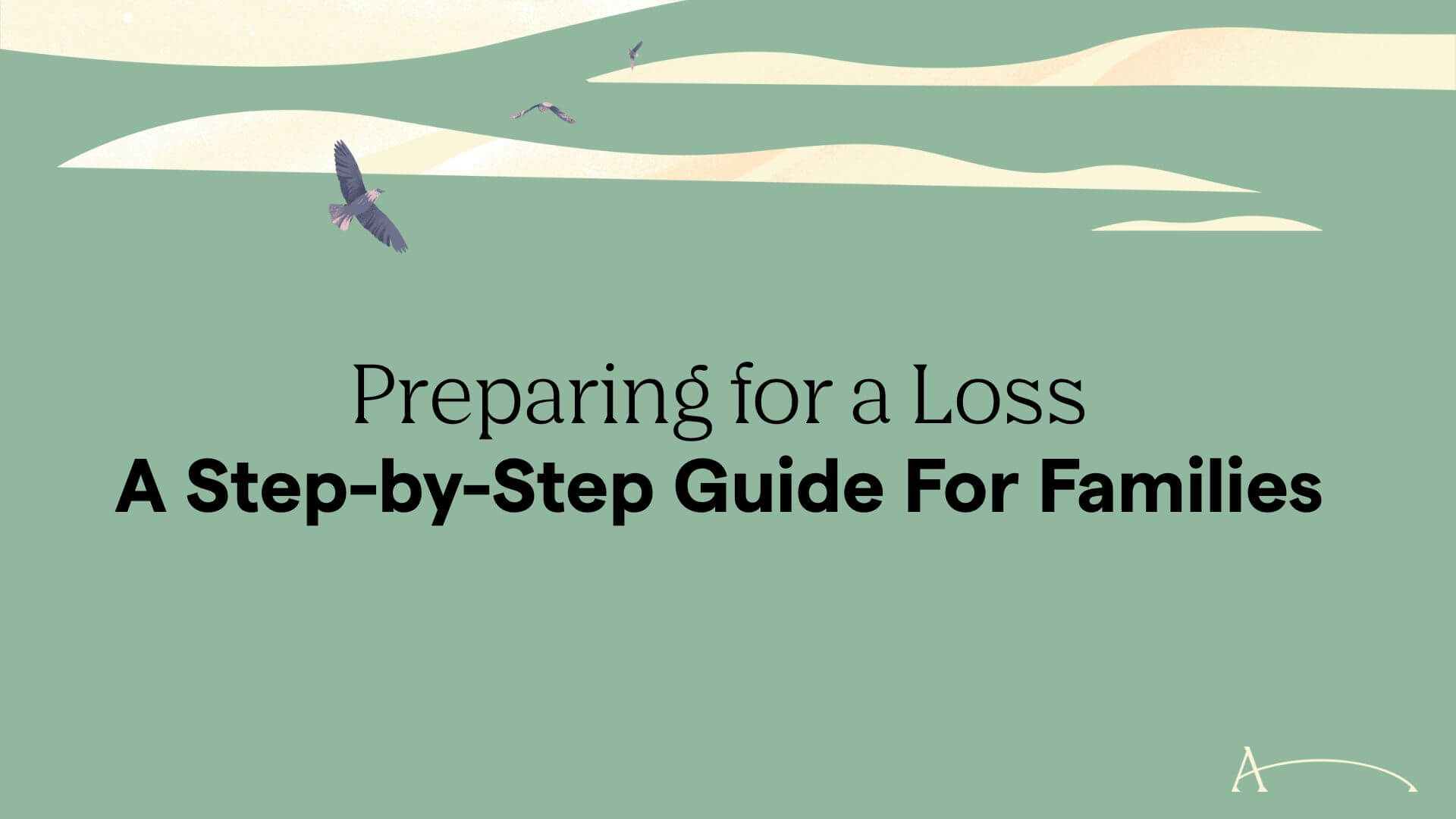
It pays to plan ahead
Preplan your own funeral arrangement online in minutes
Arrange Immediate
Cremation Services
Cremation Services
Speak to our dedicated care specialists now
End-of-life care is an essential process to increase your loved one's quality of life and to ensure their final transition is as comfortable as possible. When we accept that death is near, we can begin the grieving process early, and help our loved ones accept the inevitable. Acceptance allows both parties to focus on making the most of whatever remaining time we have with our loved ones before we say goodbye.
Our first responsibility is to increase the quality of life for our loved ones. To do this, we must become more aware of our surroundings and pay attention to the details. If the goal is to create the most comfortable and safe place for our loved ones to pass, we need to be able to recognize the signs telling us that death is soon to come.
10 Signs Your Loved One Is Dying
There are many signs that death is near, but there are 10 notable characteristics that will alert you to the impending transition, and help you prepare for it, before the death actually happens. If you are the one transitioning, preparing for your death before you die takes a giant strain off your family and friends, who will need their time and energy to grieve. So, how do you know when someone is dying?
1. Decreased Appetite
When someone begins the process of dying, they will progressively begin eating and drinking less. Their body uses less energy due to a decrease in metabolism. They simply need less food and drink to function and, many times, they don't notice it's happening. Food and water aren't necessary anymore. Their senses are also waning, so a decreased sense of taste and/or smell doesn't help increase the allure of eating and drinking.
If you notice that your loved one stops eating and drinking completely, they may be days away from peace. It's important to understand that this is the natural process of death and eating and drinking may be the very last things on their mind.
Dehydration is still always a concern because it can cause discomfort and we want our loved ones to be as comfortable as possible. Lip balm works well to help with dried-out lips and you can help get fluids into them by keeping a small sponge nearby, perhaps dipped in some flavored water. If grandpa loves watermelon, dip the sponge in the juice and put it to his lips. The familiar taste may be calming and they will be physically more comfortable because of the fluids.
2. Increased Sleep
There are many medications that cause fatigue and sleepiness, but an excess of sleep can be a significant sign that death may be soon approaching. An increase in sleep can signify a person's body is on its way to shutting down. Their metabolism has decreased and their essential energy stores have been reduced. They need to restore what energy they can for those precious moments of clarity they can spend with friends and family.
3. Self Isolation
A person who is about to pass may isolate themselves from friends and family. This is natural. They are physically weak and tired, perhaps irritable or embarrassed about their situation, and they may not be in the headspace for company. They may not want to see the pain in your eyes, or they may be thinking deeply about the mysteries of the universe.
They may also disassociate and dwell in their memories. If your loved one is still aware, they may be having some heavy thoughts. Remember, a dying person grieves as well and their cognitive abilities may be declining quickly, causing extra stress on the grieving process.
4. Erratic Vital Signs
The vital signs of a healthy person usually remain consistent and if the numbers suddenly change, that may indicate that death is near. The vital signs of an older person can be erratic. Their blood pressure can move up and down quickly and dramatically with changes in metabolism. Their breathing could slow down to a dangerous level or increase anxiously.
A person's heartbeat could become irregular, or change in speed and the person's body can begin to shut down. Their kidneys can fail, which is marked by much darker urine. The vital signs tell us what is to come.
5. Reduced/ Disrupted Waste Output
A loss of muscle control and a disruption in a person's ability to feel when they need to use the restroom may be a sign to prepare for the end. Medications can also affect the body's waste management system. But, when the kidneys start to fail, and a person stops eating and drinking, they will inevitably have much less waste output. In fact, there may be none at all in the days before death as most people eat and drink nothing at all in their last days.
6. Weakened Muscles
As a person ages, they lose muscle mass and can grow physically weaker, causing a person to move less and at a slower pace. Near the end of their lives, your loved ones may not be able to grasp a pencil, feed themselves, or turn themselves around in bed. When a person loses the ability to swallow while eating and drinking, they may stop eating and drinking entirely fairly soon.
7. Low Body Temperature
When a person is dying, all of the blood in their body rushes to the nearest organs and neglects the rest of the body that also needs oxygen, such as the skin or muscles. Without the flow of blood, skin changes colors and decreases in temperature. A low temperature means that death is near, but your loved one may not feel cold. A lack of blood circulation causes cell death, and cell death in mass quantities can cause pain.
8. Changes In Cognition
A dying person may hallucinate, step out of time, get caught up in memories, or otherwise be confused about the world. Such confusion can stem from the brain's inability to make connections and create new synapses, causing chaos in a person's thought patterns. This chaos can lead to emotional outbursts or aggression that further exacerbates anxiety.
Dementia due to old age is common, especially at the very end of life, when they may be unaware of what they are experiencing. Some people disassociate from their bodies and can be unresponsive, while others suffer from aphasia and may not be able to communicate effectively. When a person is but an inch from death, they can go into a sort of survival mode, intentionally or unintentionally.
The more non-responsive and disassociated they become, the closer they are to death.
9. Changes In Breathing
Of course, weakened muscles affect our ability to breathe. Our breathing becomes shallower, weaker, and slower. Many times, as we die, our lungs can fill with fluid, changing the sound of our cough, further decreasing our ability to obtain oxygen. Eventually, the strain on our lungs and our heart will become too much, and we can pass away peacefully, around those we love.
10. Progressive Pain
When someone is dying, there will come a point when all a doctor can do is eliminate the pain with medicine and help a person remain comfortable for as long as they are with us. This is one of the final steps of end-of-life care. Cell death, failing organs, a lack of circulation, an inability to move, and a deterioration of the mind can all cause intense pain that can only be controlled with the help of a doctor.
One way to decrease a person's psychological pain, before they pass, is to have a plan in place for when they are gone. This includes talking about their final wishes, which can come as an expensive surprise to many of those left behind. The dignity and honor of your loved one should be held in the highest regard, while the planning and execution of the process should be as easy on you as possible.
After.com offers affordable cremation services whenever you need them. While many choose to preplan with a prepaid cremation plan, we also offer affordable cremation services for immediate need. We’re here to help you navigate the complexities of death, every step of the way. Contact us today to learn more about our services.
The After Care Team
Published Date:
May 10, 2022





%20(1).png)






%20(1).png)
%20(1).png)

%20(1).jpg)

%20(1).png)
%20(1).png)
%2520(1).png)
%20(1).png)
